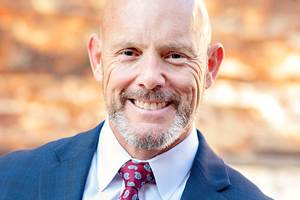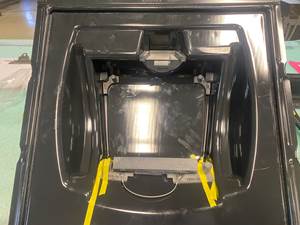The Super-Specialty Side of Thermoforming
Welch Fluorocarbon Inc. in Dover, N.H., produces nothing but tiny, super-thin thermoformed parts for critical applications.
Welch Fluorocarbon Inc. in Dover, N.H., produces nothing but tiny, super-thin thermoformed parts for critical applications. Evan Welch started his business in 1985 in Massachusetts. He had to develop his own processes for forming and heat-sealing fluoropolymer films into unique shapes for aerospace, medical, military, fire-protection and other high-value components. Most of Welch’s products use fluoropolymer films 5 to 10 mils thick, though he has formed film as thin as 1 mil.
Welch’s training came in the 1970s while working at American Durafilm in Holliston, Mass., where he developed a way to vacuum form 8 x 12 in. sheets of DuPont’s Teflon FEP into sheets of steep-sided bumps that were then die-cut into tiny insulating sleeves for pacemaker batteries. “That began a focus on vacuum forming of fluoropolymers,” he recalls. “DuPont would send me leads, and I would figure out how to make what they wanted. I became the person to talk to.”
Once he started his own company, he continued to develop that specialty, designing and building his own single-station vacuum forming machines with very rapid heating and high-temperature capability. The machines use two 6800-watt heater banks made of a special Nichrome resistance ribbon fabricated for Welch by Process Thermodynamics Inc. in Brandon, Minn. These units heat up in less than a minute to a surface temperature of over 1000 F. His three production machines are identical to one lab line used for prototyping, so when a part goes commercial, he simply moves the tools from the lab to the production area.
No-fail parts
In Welch’s markets, there’s no room for product failure. His custom products include corrosion barriers for air regulators in gas masks and a liner of DuPont’s Kapton polyimide for a smoke hood used by commercial flight crews. The Federal Aviation Administration requires the hoods to withstand 1000 F for 5 seconds and to keep a person alive for 20 minutes in an oxygen-depleted environment.
NASA came to Welch for PE bags that astronauts could urinate into. Welch is the sole supplier of these vacuum-formed bags, which are folded over and heat sealed with Kapton adhesive tape to reinforce the edges. They cost $40 each and take 28 manufacturing steps to make.
Welch also makes dozens of types of pacemaker battery insulator sleeves. One of the most challenging is formed of 10-mil fluoropolymer film and measures just 0.25 x 0.5 in. but is drawn 2-in. deep.
Quality control for such critical products requires a positive working environment, Welch believes. He pays extremely generous benefits to his 25 employees: 100% of medical insurance at a cost of $11,000 per family and a 401K program with 50% matching of employee contributions up to 10% of salary. When one employee developed multiple sclerosis, Welch redesigned that man’s job so he could keep working. As a result, Welch Fluorocarbon won the National MS Employer of the Year Award in 2000.
Pro-active inventions
Sometimes Welch develops a process before he has a customer, figuring that once he can make it, someone will want it. For example, in 1988 he successfully vacuum formed Honeywell’s Aclar CTFE, a highly crystalline material with a Tg of 360 F. He heated a sheet of Aclar to 440 F to make it amorphous and easily formable, then cooled it to room temperature so fast, it didn’t have time to regrow crystals. He thus obtained clear, thin, flexible CTFE parts. He now vacuum forms over 20,000 lb/yr of CTFE for parts like moisture-protection covers for electrical circuitry. He designed and built two special automatic thermoforming machines just for the moisture covers.
Welch recently developed a unique process to form a sheet of 5-mil Teflon film over substructures like a foam donut or a silicone gasket. It took him six months of work. The process is being considered for gaskets for sanitary piping. Welch charges customers the full cost of his R&D time. “We’re not afraid to charge the customer for that which is unique,” he explains. “But mostly, I want people to look at one of my parts and say, ‘How the hell did he do that?’”
Related Content
Thermoformed Container Keeps Battery Cells Safe
Despite last-minute design changes and other unexpected roadblocks, thermoformer TriEnda works with a key supplier on innovative reusable shipping container.
Read MoreOMV Technologies Gets New CEO
Kooper brings 33 years of experience in the industrial and consumer packaging industries to OMV--the closed-loop, turnkey, inline extrusion, thermoforming and tooling systems manufacturer.
Read MoreThermoformer Maximizes Productivity with 3D Printing
Productive Plastics has created an extensive collection of 3D printed manufacturing aids that sharply reduce lead times.
Read MoreExxonMobil Develops High-Performance, 95% PE Recyclable Thermoformed Packaging
The packaging solution involved a collaboration with equipment suppliers Hosokawa Alpine and Multivac Group.
Read MoreRead Next
See Recyclers Close the Loop on Trade Show Production Scrap at NPE2024
A collaboration between show organizer PLASTICS, recycler CPR and size reduction experts WEIMA and Conair recovered and recycled all production scrap at NPE2024.
Read MoreFor PLASTICS' CEO Seaholm, NPE to Shine Light on Sustainability Successes
With advocacy, communication and sustainability as three main pillars, Seaholm leads a trade association to NPE that ‘is more active today than we have ever been.’
Read MoreMaking the Circular Economy a Reality
Driven by brand owner demands and new worldwide legislation, the entire supply chain is working toward the shift to circularity, with some evidence the circular economy has already begun.
Read More














